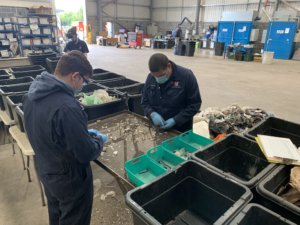HOW TO OPTIMISE YOUR PLANT PERFORMANCE AND MAXIMISE UPTIME
Energy from Waste is an effective way to divert waste that is otherwise bound for landfill, but how can you tackle the issues that arise when the feedstock delivered to your bunker does not meet the specifications of your plant, and how can you increase plant performance?
WASTE COMPOSITION – CAN YOUR PLANT PERFORM BETTER?
The composition of residual waste is forever evolving, with changes to food recycling, purchasing habits and global issues such as the COVID pandemic.
When changes occur in the waste stream, they can negatively impact the quality of the material through an increase in the calorific energy value, and whilst most EfW facilities operate within a reasonably wide window of throughput versus calorific value of waste, significant changes require careful process control.
Higher inefficiencies could result in a higher risk of corrosion within boiler tubes in the furnace and superheaters, leading to an increase in operational costs and the possibility of expensive repairs needed to plant equipment.
PLANT PERFORMANCE – ANALYSIS OF MATERIALS
In order to effectively reduce operational costs, increase plant performance and drive maximum uptime, Energy from Waste facilities must administer strict analysis regimes.

WASTE COMPOSITION ANALYSIS (WCA)
A thorough Waste Compositional Analysis (WCA) of the input material can help operators build a reliable profile of their waste. Through this, it is possible to gain valuable insights into the levels of different elements and potentially harmful contaminants within their commodity.
Further tests can also be carried out on the materials to determine the specific size of materials, referred to as a Size Analysis. Combined with category analysis this gives information on which materials are present for a range of size fractions.
Chemical Analysis
A comprehensive Chemical Analysis of your waste can help you to measure the total energy output available, the renewable content and the level of contaminants within your materials.
One of the most damaging elements for EfW equipment is Chlorine Cl. By analysing the Chlorine content of your fuel, you can make the necessary changes required to alter your material in order to avoid damages, expensive repair fees and costly downtime.
A chemical analysis of your material can also highlight important aspects of energy efficiency, such as the Gross and net Calorific Value and Moisture Content. Through understanding these figures, you can make the required changes to your material in order to maximise the total output of your facility.
LOOKING TO OPTIMISE YOUR PLANT PERFORMANCE?
Get in touch with an expert regarding your waste derived fuels using this link.